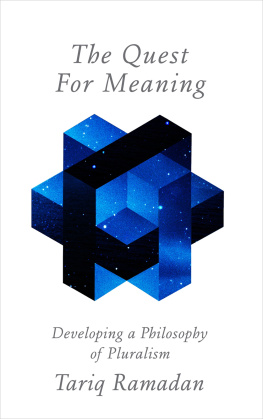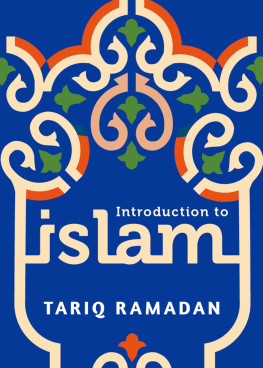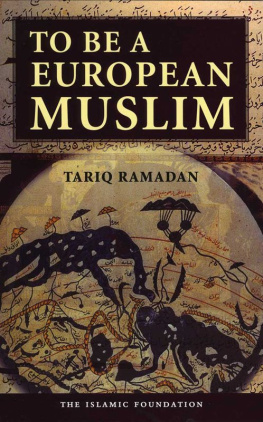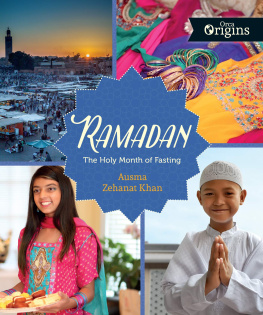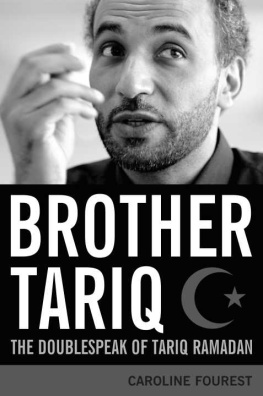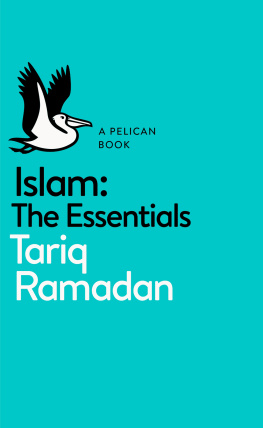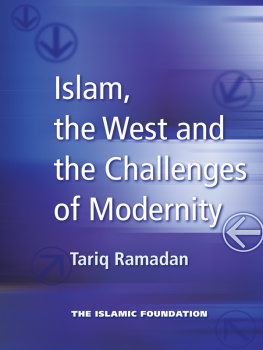TARIQ RAMADAN
The Quest for Meaning
Developing a Philosophy of Pluralism

ALLEN LANE
an imprint of
PENGUIN BOOKS
ALLEN LANE
Published by the Penguin Group
Penguin Books Ltd, 80 Strand, London WC2R 0RL , England
Penguin Group (USA) Inc., 375 Hudson Street, New York, New York 10014, USA
Penguin Group (Canada), 90 Eglinton Avenue East, Suite 700, Toronto, Ontario, Canada M4P 2Y3 (a division of Pearson Canada Inc.)
Penguin Ireland, 25 St Stephens Green, Dublin 2, Ireland (a division of Penguin Books Ltd)
Penguin Group (Australia), 250 Camberwell Road, Camberwell, Victoria 3124, Australia
(a division of Pearson Australia Group Pty Ltd)
Penguin Books India Pvt Ltd, 11 Community Centre, Panchsheel Park, New Delhi 110 017, India
Penguin Group (NZ), 67 Apollo Drive, North Shore 0632, New Zealand
(a division of Pearson New Zealand Ltd)
Penguin Books (South Africa) (Pty) Ltd, 24 Sturdee Avenue, Rosebank 2196, South Africa
Penguin Books Ltd, Registered Offices: 80 Strand, London WC2R 0RL , England
www.penguin.com
First published 2010
Copyright Tariq Ramadan, 2010
The moral right of the author has been asserted
All rights reserved.
Without limiting the rights under copyright reserved above, no part of this publication may be reproduced, stored in or introduced into a retrieval system, or transmitted, in any form or by any means (electronic, mechanical, photocopying, recording or otherwise) without the prior written permission of both the copyright owner and the above publisher of this book
ISBN: 978-0-14-191957-7
To the semi-colon;
Despite the diversity of languages, there is some form of punctuation that is universal and common to them all.
In a world of simplified communications and simplistic binary judgements, the semi-colon reconciles us with the plurality of propositions, and with the welcome nuances of the sentence and of complex realities.
To my former students, who will rediscover here the fragrances of a teaching of philosophy.
And who will not forget to say to those they love that they love them.
Life is fragile.
Ocean and Windows
This book is a journey, and an initiation. It is actually about setting out and travelling the paths of the heart, the mind and the imaginary.
There has never been more talk of diversity and plurality than in this era of globalization and modernization, and yet, more so than ever before, we seem to be trapped into our identities and differences. The global world is a village; they say a village of villagers who know nothing of each other. In more senses than one: they do not know who they are, and they do not know who they are living with. This situation can only lead to half-hearted, fearful and dormant conflicts rather than a confident celebration of our riches: Edward Said suggested it would lead to the clash of ignorance; I propose it will lead to a conflict of perceptions. Perceptions are more telling than ignorance: perceptions can certainly result from ignorance, but they express a relationship with ourselves and others that has to do with more than knowledge. Perceptions have to do with feelings, emotions, convictions and psychology. We are lacking in confidence. Confidence in ourselves, confidence in others, confidence in God and/or man, and/or the future. We are lacking in confidence, no shadow of a doubt about that. Fear, doubt and distrust are imperceptibly colonizing our hearts and minds. And so the other becomes our negative mirror, and the others difference allows us to define ourselves, to identify ourselves and, basically, gives us some reassurance. The other becomes our diversion, in Blaise Pascals sense of the term. The other distracts us from ourselves, our ignorance, our fears and our doubts, whilst the presence of the other justifies and explains our suspicions. We have projections, but at the same time we have to admit that we have no projects.
We therefore have to get back to some elementary truths. Simple, profound truths. We have to set out, ask the essential questions and look for a meaning. We have to travel towards ourselves and rediscover a taste for questions, constructive criticism and complexity. We begin by establishing a first thesis of truth that should naturally foster an attitude of intellectual modesty and humility: we all observe the world through our own windows. A window is a viewpoint over a horizon, a framework, a piece of glass that is always tinted to some extent, and it has its orientation and its limitations: all this, together, imparts its colour and qualities to the surrounding landscape. We have to begin, humbly, by admitting that we have nothing more than points of view, in the literal sense, and that they shape our ideas, our perceptions and our imagination. Coming to terms with the very essence of the relativity of our gaze does not imply that we have to doubt everything and can be sure of nothing. It might mean quite the opposite, and the outcome might be a non-arrogant confidence, and a healthy, energetic and creative curiosity about the infinite number of windows from which we all observe the same world. The plurality is such that we have doubts as to whether we are talking about the same world, the same questions and the same humanity. Within the global village, in the meantime, our increasingly pronounced individualism even leads us to doubt the fact that there are such things as fragments of philosophy behind the calculations of our respective drive for power and self-interest. And what can the ego make out of egoisms?
The point I am making is that we cannot go on standing at our windows. Off we go, we said, along the paths of the heart, the mind and the imaginary! The horizon ahead of us offers us a choice between two paths: we can go from window to window, from one philosophy to another and from one religion to another, and try to understand, one by one, traditions and schools, their teachings and their principles. As we go from one to another, from ourselves to others, we will find many similarities, many things in common and many shared values. Or we can take the other path, which leads us into the very heart of the landscape and then invites us to turn our gaze on the windows around us. Once we take that path, it is no longer a question of considering the multiplicity of the observers but of plunging into the object we are all observing, and then apprehending the diversity of our points of view and the essence of their similarity. Once we have accepted the existence of our window, we therefore have to travel, set ourselves free, plunge into the ocean, set sail, go on, stop, founder, resist, set off again, set sail once more, and remember that the ocean exists only because of the presence of the many shores that make it one ocean, and that their presence is also our only hope of survival. And vice versa.
We have chosen the second path, and we wish to accompany our reader to the heart of what we are observing, so as to apprehend with confidence and humility the myriad observers. This is what I call a philosophy of pluralism, which states that, by immersion in the object per se, we will be able to meet human beings, or subjects, with their traditions, their religions, their philosophies, their aesthetics and/or their psychologies. Each chapter will therefore deal with one theme, with one element in the landscape of philosophy: the quest for meaning, the universal, freedom, fraternity, education, memory, forgiveness, love, and so on, and we will try, as we stand in the centre, to address and understand the diversity and creativity that well up from the windows. The notions of equality, freedom, humanity, emotion and memories belong, for instance, to all traditions and all philosophies, but their absolute truth is in no ones possession. And, as we shall demonstrate, the universal can only be a universal that is shared.
Next page
